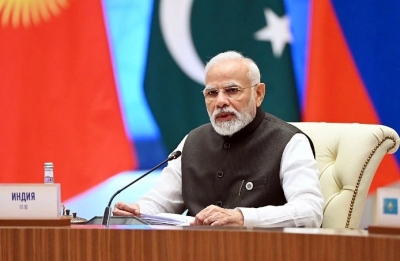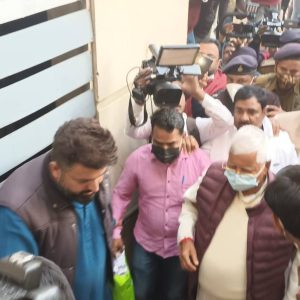India is the only member nation at the Shanghai Cooperation Organisation (SCO) to oppose the project…reports Asian Lite News
India once again declined to endorse China’s ambitious Belt and Road Initiative (BRI) during the Shanghai Cooperation Organisation (SCO) virtual summit on Tuesday, becoming the only member nation to oppose the project.
The summit, hosted by India, concluded with a declaration that reaffirmed support for the BRI from other member states, including Russia, Pakistan, Kazakhstan, Kyrgyzstan, Tajikistan, and Uzbekistan.
The declaration highlighted ongoing efforts to link the construction of the Eurasian Economic Union with the BRI, supported by all members except India.
Additionally, it emphasized the importance of increasing the use of national currencies in mutual settlements among interested SCO members, and underscored the significance of implementing the SCO Economic Development Strategy 2030.
This strategy prioritizes cooperation in areas such as the digital economy, high technology, and the modernisation of transport routes.
Prime Minister Narendra Modi, in his opening remarks, stressed the need for stronger regional connectivity but emphasized that such efforts must respect the sovereignty and territorial integrity of member states, as outlined in the SCO charter.
Modi’s statement appeared to reflect India’s longstanding concerns about the BRI’s impact on territorial integrity, particularly regarding China’s projects in Pakistan-occupied Kashmir.
Despite India’s refusal to endorse the BRI, the declaration affirmed the member states’ commitment to socio-economic development, digital transformation, and modern infrastructure projects aimed at improving living standards across the SCO region.
The summit also addressed the situation in Afghanistan, calling for the establishment of an independent, democratic, and peaceful state, free from terrorism and drugs. Member states stressed that resolving the Afghan crisis is critical for maintaining stability in the broader SCO region.
‘Don’t look at CPEC through political prism’
Pakistan Prime Minister Shehbaz Sharif indirectly sneered at India during his opening speech at the 23rd meeting of the Head of Governments of SCO (Shanghai Cooperation Organisation) held here on Wednesday.
Without naming India, Pakistan PM Shehbaz Sharif spoke about the importance of CPEC (China-Pakistan Economic Corridor) and advised New Delhi to stop looking at the partnership between Pakistan and China with regard to CPEC and CPEC-2 through a political prism.
“Pakistan-China economic partnership in CPEC and CPEC-2 holds massive regional importance and should not be looked at through the lens of political prism,” said PM Shehbaz Sharif during his opening speech at SCO meeting in Islamabad.
Even though PM Shehbaz did not call out India by name, the above-mentioned statement is an indirect jibe at India, which has been critical of Pakistan and China’s economic cooperation through CPEC and CPEC-2, the flagship project of China’s multi-billion dollar project under its One Belt One Road (OBOR).
PM Shehbaz also called on the SCO member states to join together and realise the opportunity Afghanistan presents to the regional states for economic and development cooperation, insisting that joint efforts are required to ensure that Afghanistan soil is not used against any neighbouring state by any element to spread terrorism.
“Afghanistan needs to work towards forming a government system which represents inclusivity. The SCO member states should come together to ensure cooperation with Afghanistan and ensure that its soil is not used to spread terrorism among neighbours by any elements,” he said.
Indian Minister for External Affairs (MEA) S. Jaishankar is among the prominent leaders present in Islamabad for the SCO meeting. Jaishankar landed in Pakistan on Tuesday and was seen rubbing shoulders with Pakistan PM Shehbaz Sharif during the SCO family photo while both had a comfortable and warm handshake at the dinner hosted by the government for all SCO member states.
It is pertinent to note that India has been critical of China and Pakistan and has repeatedly raised serious questions and concerns over CPEC projects, slamming Islamabad for allowing China to increase its presence in disputed regions of Jammu & Kashmir and Gilgit-Baltistan.














